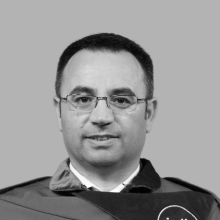
Yemliha Yildiz completed his undergraduate education in the Department of Biology at Anadolu University, Faculty of Science in 2006. After he got his Master’s degree in the Department of Molecular Medicine at Istanbul University Aziz Sancar Institute of Experimental Medicine in 2008, he got his doctorate in 2015 in the same department. In 2016, Dr. Yildiz has become an assistant professor in the Department of Medical Biology at Istinye University Faculty of Medicine. Dr. Yildiz, who started studying gene cloning when he was an undergraduate, studied cancer and specifically breast cancer after his graduation and he has been still doing his investigations in these areas. As he has 7 international and 2 national published articles, Dr. Yildiz also has several oral and written presentations in both national and international congresses. He worked as a Vice Principal of Vocational School of Health Services at Istinye University between 2016 – 2017. Dr. Yildiz has been the Principal of Istinye University Vocational School of Health Services since 2017.
Araştırma Alanları
- Cancer Biology
- Breast Cancer
- Molecular Biology
Çalışma Alanları
- Sağlık Bilimleri Temel Alanı
- Tıbbi Biyoloji
- TRAIL C1595T Variant Critically Alters The Level of sTRAIL in Terms of Histopathological Parameters in Colorectal Cancer , 2023
- Endogenous retrovirus HERV-K6 and HERV-K11 polymorphisms analyses in head and neck squamous cell carcinoma patients, 2021
- Investigation Of Nitric Oxide Synthase 3 (Nos3) Glu298asp Gene Variation In Breast Cancer Patients, 2018
- Mitochondrial DNA analysis of the domestic dogs in Turkey, 2017
- MEME KANSERLİ HASTALARDA ABCG2 G34A GENPOLİMORFİZMİNİN İNCELENMESİ, 2017
- Mitochondrial DNA analysis of the domestic dogs in Turkey, 2017
- Association between Laryngeal Squamous Cell Carcinoma and Polymorphisms in Tumor Necrosis Factor Related Apoptosis Induce Ligand (TRAIL), TRAIL Receptor and sTRAIL Levels, 2014
- Association between Laryngeal Squamous Cell Carcinoma and Polymorphisms in Tumor Necrosis Factor Related Apoptosis Induce Ligand TRAIL TRAIL Receptor and sTRAIL Levels, 2014
- Nitrik Oksit Sentaz 3 NOS3 Glu298Asp Gen Varyasyonunun Meme Kanserli Hastalarda İncelenmesi, 2013
- Bax promoter G 248 A polymorphism in a Turkish clinical breast cancer patients A case control study, 2013
- sTRAIL Serum Levels and TRAIL 1595 Genotypes Association with Progress and Prognosis of Colorectal Carcinoma, 2012
- Is there any correlation between TNF related apoptosis inducing ligand TRAIL genetic variants and breast cancer, 2010
- The influence of cyclin D1 A870G polymorphism on colorectal cancer risk and prognosis in a Turkish population, 2010
- Breast cancer and cyclin d1 gene polymorphism in Turkish women, 2009
- The Individual and Combined Effects of CTLA4-Cd28 variants and oxidant-antioxidant status on the development of Colorectal Cancer, 2014
- ABCA1 POLYMORPHISMS IN TYPE II DIABETES MELLITUS, 2007
- Investigation of The Possible Effect of Foxp3 C/A Gene Variants in Laryngeal Cancer, 2019
- Mide Kanserli Türk Hastalarda PD-1 Gen Polimorfizminin (PD-15 C T) İncelenmesi, 2019
- PD-1/PD-L1 Genetic Variants And Soluble PD-1 LevelsIn Gastric Cancer., 2018
- Investigation of PD-1 Gene Polymorphism (PD-1.5 C/T) in Turkish Patients with Gastric Cancer, 2017
- Meme Kanserli Hastalarda ABCG2 Gen Polimorfizmleri Ve Serum Düzeyinin İncelenmesi,
- İnvestigation of TNF-Related Apoptosis İnducing Ligand And Bcl-2 Associated X Protein Gene Polymorphisms In Breast Cancer Patients,
- MİDE KARSİNOMALI VAKALARDA TRAIL C1595T (rs1131580) GEN VARYANTININ KLİNİK VE HİSTOPATOLOJİK AÇIDAN İNCELENMESİ,
- ABCA1 Polymorphisms In Type II Diabetes Mellitus,
- Breast Cancer And Cyclın D1 Gene Polymorphısm In Turkısh Women IUBMB LIFE 61 3 353 353 Turkey P 102, 2009
- IS THERE ANY CORRELATION BETWEEN CYCLIN D1 G870A POLYMORPHISM AND GASTRIC CANCER RISK IN TURKISH PATIENTS P 100, 2009

